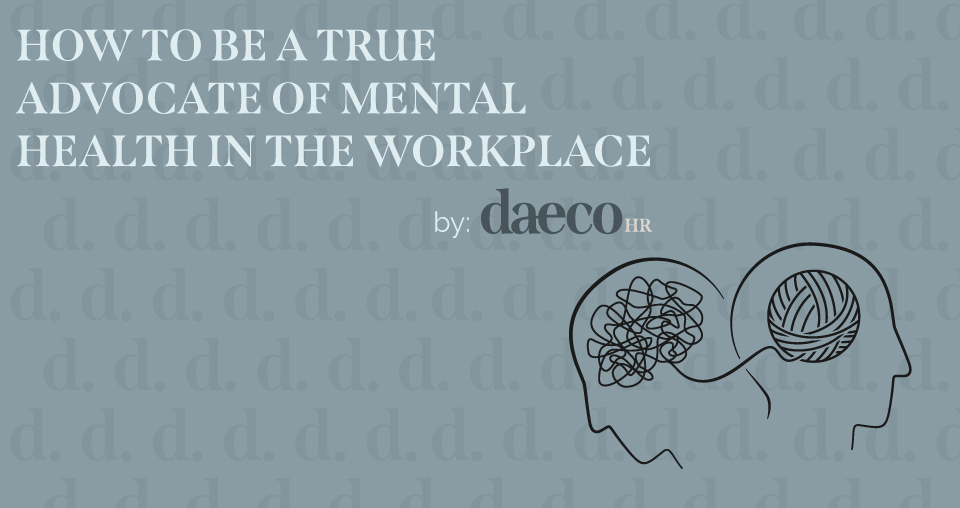The conversation regarding mental health has blossomed in recent years as society understands the far-reaching effects of poor mental health on individuals, families, and organizations. While access to help on an individual level may be limited, providing mental health support on an organizational level can help alleviate stresses that can otherwise have a wider economic and societal impact.
The Benefits of Advocating For Mental Health In the Workplace.
Personal and professional lives are not easily separated, and challenges in one area undoubtedly affect other aspects of your employee’s life. While family life difficulties impact a person’s mood and attitude, conflict and unease in the workplace also have a similar effect.
By providing appropriate resources and support, your employees can better navigate and deal with mental health challenges. When your employees feel that you care about their well-being, this boosts morale which results in the following:
- Enhanced motivation
- Happier employees
- Increased job productivity
- Fewer absences
- Lower employee turnover rate

How to Create a Culture of Mental Health Awareness.
While introducing the subject of mental health is crucial for any organization, successfully promoting the initiative requires integrating mental health awareness into the organizational culture. Special events focusing on mental health, and continued discussion, will allow your employees to engage in the subject and help you develop initiatives to better support their mental well-being.
There are several actions you can take to promote mental health awareness in your workplace:
Be Willing to Talk About Mental Health.
Removing the stigma surrounding mental health requires business leaders and managers to lead the conversation in the workplace. Expressing your own vulnerability and personal experiences surrounding mental health helps to promote the conversation positively. In adopting an open and compassionate stance on the subject, employees are more likely to engage in your initiatives.
Educate Managers on Mental Health.
Your managers are in a key position to detect poor mental health within your workforce. Educate them about the signs of mental health problems, such as stress, anxiety, and depression. While these symptoms may be difficult to detect, simply being aware of changes in mood or mannerisms can reflect a problem, so having the training to respond appropriately is vital.
Training such as Mental Health First Aid courses can be beneficial to both staff and managers. As a manager, your role is not to counsel but to ensure your staff get the appropriate support they need from a Mental Health professional.
Employee Feedback to Better Direct Resources.
Pulse surveys conducted to understand what your employees need to achieve well-being is helpful when developing new initiatives. Making them part of the process will also result in better engagement and higher success rates in achieving the desired goal.

Provide Resources for Your Team to Access.
Promoting effective mental health awareness requires building trust amongst your employees. To instill a culture of mental health awareness, you must successfully bring the subject to the forefront of your employees’ minds. This can be done in a variety of ways:
Host a Lunch and Learn Opportunity.
A lunch and learn event is the ideal forum to introduce the subject of mental health. While historically, mental health has been viewed negatively, keeping the event fun and casual will help to lighten the mood and facilitate better acceptance.
Check-in With Your Employees On a Regular Basis.
Mental health is a delicate subject, so managers must receive the appropriate training to be more effective in identifying and advocating for their employees’ well-being. As a manager, your role is to listen and identify workplace resources for your staff – leave the counselling to a Mental Health Professional. You are there to direct the employee to the appropriate resources and supports where needed. Actively checking in with your employees to see what support they need will strengthen your relationships.
Providing a personalized response is important, as what works for one employee may not necessarily work for another. Bear in mind that your employee’s comfort level towards the initiatives may be dictated by personality and cultural differences.
Provide Continual Support.
Employee Assistance Programs are becoming commonplace in organizations as a baseline resource to support employee well-being. Many of these programs provide immediate and confidential support services to navigate challenges related to the workplace and personal lives of employees. Adding the benefit of personal counselling services to extended health plans is also useful when employees need extra support.
Reminding employees of available support and making these resources easily accessible is vital for the successful adoption of any mental health awareness program.

HR Consulting Services in Edmonton.
At Daeco HR, we believe that success is a multi-faceted concept. While revenue and gross profits are key indicators of an organization’s business performance, a truly successful organization prioritizes the well-being of its most valuable asset – its people.
This concept of advocating for mental health and well-being within the workplace is not new to us. We successfully employ well-being programs in our own business and in many others across numerous industries. We’d love to be your HR consulting experts. Let us help you implement an employee well-being program that focuses on promoting your success in all areas of your organization.
